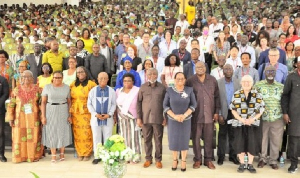 Global malaria leaders and experts from 36 countries at UHAS
Global malaria leaders and experts from 36 countries at UHAS
Global malaria leaders and experts from 36 countries in Africa, Europe, and the Americas have congregated at the University of Health and Allied Sciences (UHAS), Ho, for a leadership development course (LDC), dubbed: 'The Science of Defeating Malaria 2024.'
The platform sought to create a leadership framework supporting the strategic shift from malaria control to elimination and global eradication, towards creating a shared understanding and knowledge-based science of malaria.
Professor Evelyn Ansah, UHAS Lead for the Science of Defeating Malaria Joint Secretariat, Ghana, said the lessons learned from the COVID-19 pandemic had reactivated efforts to do things differently and empower researchers and scientific institutions to innovate to eradicate malaria.
She said the Leadership Development Course was replicated in Africa, with the maiden edition held last year by Cheikh Anta Diop University in Dakar, Senegal, under the auspices of Prof Dauda Ndiaye, an alumnus of the 2012 edition.
Prof Ansah, the Director of the Centre for Malaria Research at UHAS, said the transition of the course to Africa was marked by the change in its former name from 'Science of Eradication: Malaria' to 'Science of Defeating Malaria.'
She paid glowing tribute to the pacesetters, Professors Dyann Wirth of Harvard University, Pedro Alonso of the Barcelona Institute for Global Health, and Marcel Tanner of the Swiss Tropical and Public Health Institute, who established the game-changing LDC in 2012.
The course curriculum has evolved and adapted to the changing needs of the global malaria community, with major actors involved in a global engagement called: 'Rethinking Malaria in the Context of COVID-19.'
Prof Ansah said the Centre was eager to use its network of professionals and teaching faculties to move the course to malaria-endemic countries in a sustained and equitable manner that builds upon a priority of partnering with African universities.
Prof Lydia Aziato, the Vice-Chancellor of UHAS, in a welcoming remark, said the cross-institutional and country support underscores the significance of global collaboration, teamwork in research, and academic fellowship in the fight against malaria, one of humanity’s most persistent global health challenges.
She was optimistic that the leadership course would present a unique opportunity to sharpen skills and forge new pathways towards malaria eradication and urged participants to help drive change in their communities, institutions, and at the country level.
She commended Prof Ansah, Ms Carmen Mejia from Harvard University, US, and Prof Dauda Ndiaye from Cheikh Anta Diop University in Senegal, as well as the planning committee, for their unwavering commitment to the success of the programme.
Addressing the participants, Dr Anthony Nsiah Asare, the Presidential Advisor on Health, said Ghana had made significant progress in efforts to control and eliminate malaria over the years, though it is identified as one of the top 10 high-burden countries in the world.
He said malaria deaths had seen a consistent dip from the high of 3,259 in 2011 to 147 in 2022, with parasite prevalence in children under five years reducing to 8.6 per cent in 2022 from 27.5 per cent in 2011.
The World Health Organisation (WHO) and other partners in the global health community are working assiduously to ensure sufficient vaccine supply to meet demand and benefit children in areas designated as high endemic, with the LDC offering the platform for cross-fertilization of ideas.
Dr Nsiah Asare expressed optimism that the Yaoundé Declaration for Accelerated Malaria Mortality Reduction in Africa would be translated into tangible initiatives, backed by political and multisectoral support for national programmes, strategic use of the best technical guidance and information, and strengthening of health systems.
He said the government was upbeat about the eradication of malaria and consequently unveiled the National Malaria Elimination Strategic Plan (NMESP) 2024-2028 on the theme: 'Zero Malaria Starts Now: Launching Ghana’s Path to Elimination.'
He urged the participants – scientists, researchers, advocates, educators, and policy advisors – to use the rich platform to create networks towards the course for eradication and commended UHAS for hosting the programme on behalf of the Government.
Representatives from the WHO, Global Malaria Programme, US President’s Malaria Initiative, Malaria Elimination Programme, and Ghana Health Service attended.